Feng Shui is an ancient Chinese art that focuses on creating harmony in our living spaces. It sees the bedroom as the most important room in the house. This practice aims to arrange objects and spaces to boost positive energy, or “chi.”
By using Feng Shui in the bedroom, we can make it a peaceful and refreshing place. It helps us sleep better and feel more balanced.
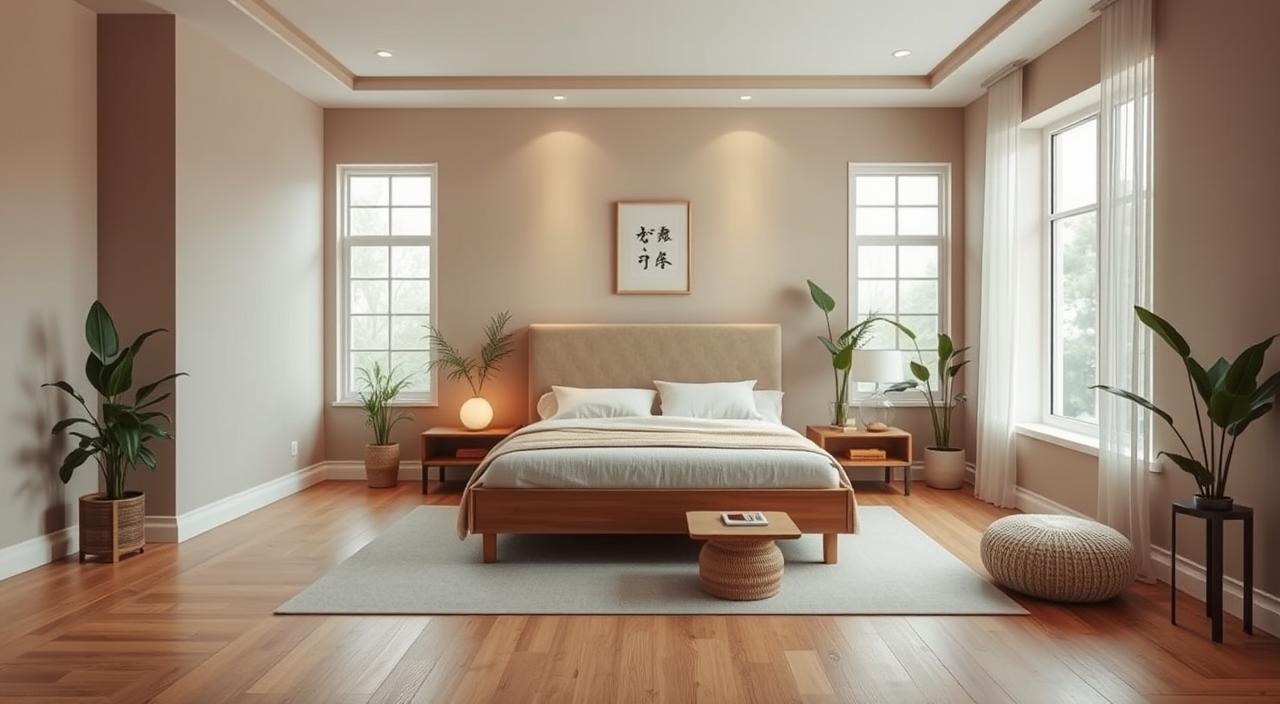
Key Takeaways
- The bedroom is the most crucial space in the home for Feng Shui practices.
- Proper bed positioning, symmetry, and color choices can enhance the flow of positive energy.
- Decluttering and minimizing electronic devices are essential for promoting restful sleep.
- Incorporating natural elements like plants and natural bedding materials can improve Feng Shui.
- Balance and harmony in the bedroom design are crucial for achieving a serene and rejuvenating environment.
Importance of Feng Shui in the Bedroom
Feng Shui is an ancient Chinese practice that makes living spaces harmonious. In the bedroom, it’s especially important. The way we arrange our bedroom affects our sleep and energy.
Feng Shui Principles and Their Impact on Sleep
Feng Shui experts say that how we place objects in the bedroom affects energy flow. By using Feng Shui, we can make our bedroom a place for rest and renewal. This is key in today’s world, where stress is common.
The Bedroom as the Most Crucial Space in the Home
The bedroom is vital because we spend a lot of time there resting. By using Feng Shui, we can make it a peaceful place. This is crucial for our well-being, especially with the rise of stress.
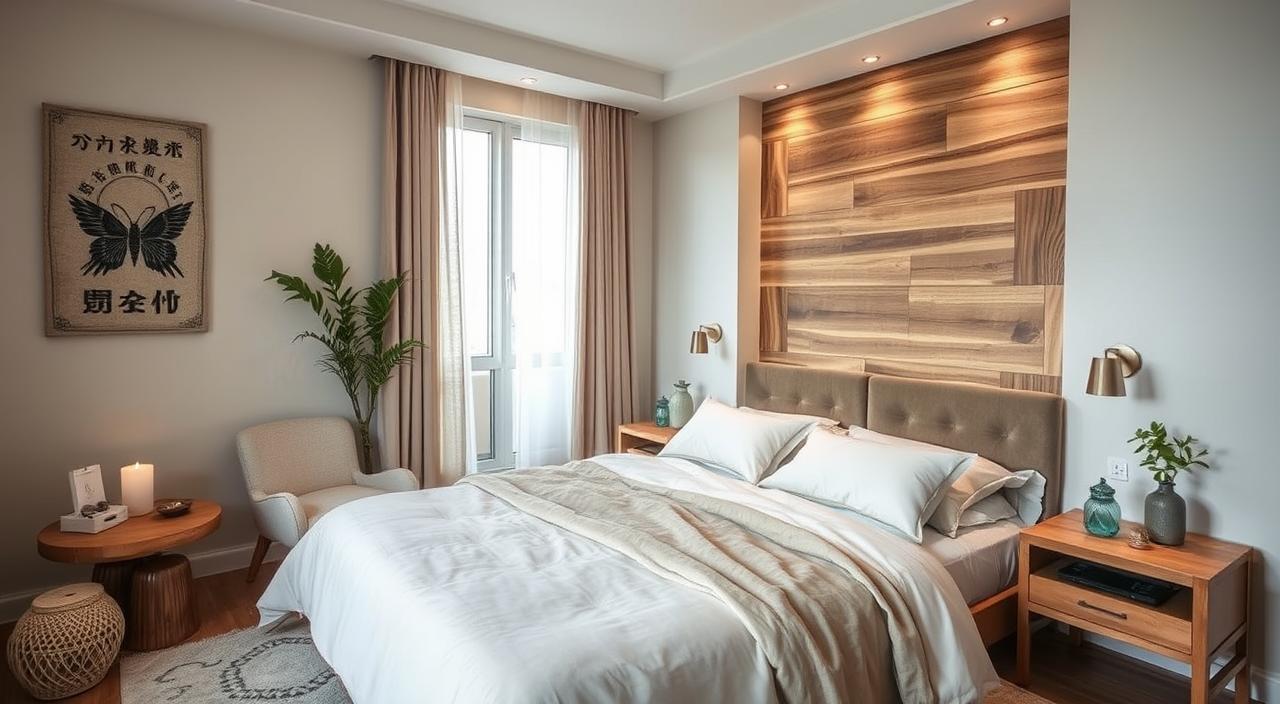
“Feng Shui experts suggest balancing the bedroom environment with elements such as wooden furniture, animal prints, candles, and water features to create warmth and grounding.”
Using Feng Shui in the bedroom can greatly improve our sleep and energy. It helps us create a peaceful space that supports our health. By understanding Feng Shui’s role in the bedroom, we can make our home a sanctuary.
Bed Positioning for Optimal Feng Shui
Placing your bed correctly is key for a peaceful sleep space, as Feng Shui teaches. The “commanding position” is best, where your bed is at an angle to the door. This lets you see the door but not be right in front of it.
This spot is thought to make you feel safe and in control, helping you sleep better. Don’t put your bed in a corner or under a window. This keeps the room’s energy flowing well and feeling open.
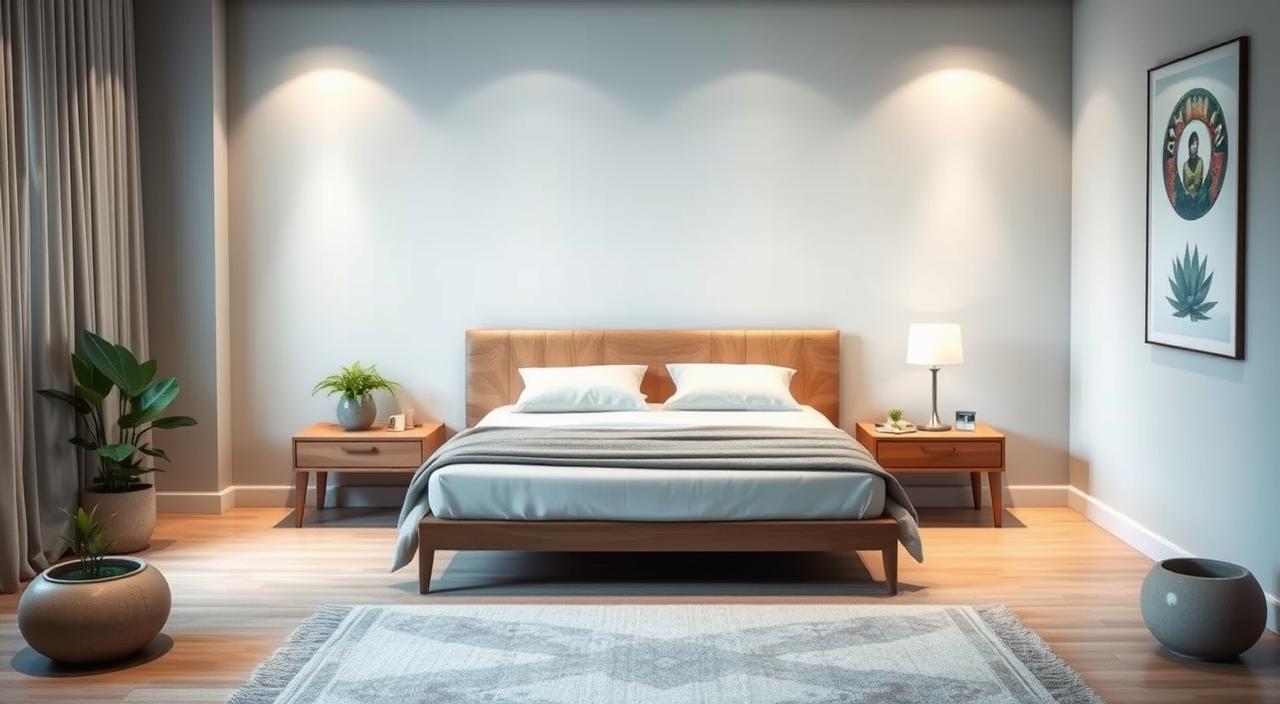
Feng Shui warns against beds near bathroom walls. It can mess with the room’s energy balance. Also, beds under or against windows are not good. They can make your sleep less comfortable because of temperature changes and feeling exposed.
By following Feng Shui for your bed’s spot, you make your sleep area calm and cozy. It helps you relax, find balance, and sleep well. The aim is to improve your energy flow, which boosts your health and happiness.
Feng Shui for bedroom, restful sleep Feng Shui
Feng shui offers great tips for a peaceful sleep space. Experts suggest ways to make your bedroom better for sleep. One important thing is where you put your bed.
Don’t place your bed where you can see the door straight on. This is called the “coffin position” and can mess with the energy. Instead, put your bed where you can see the door but not straight on. This makes you feel safe and in control, helping you sleep better.
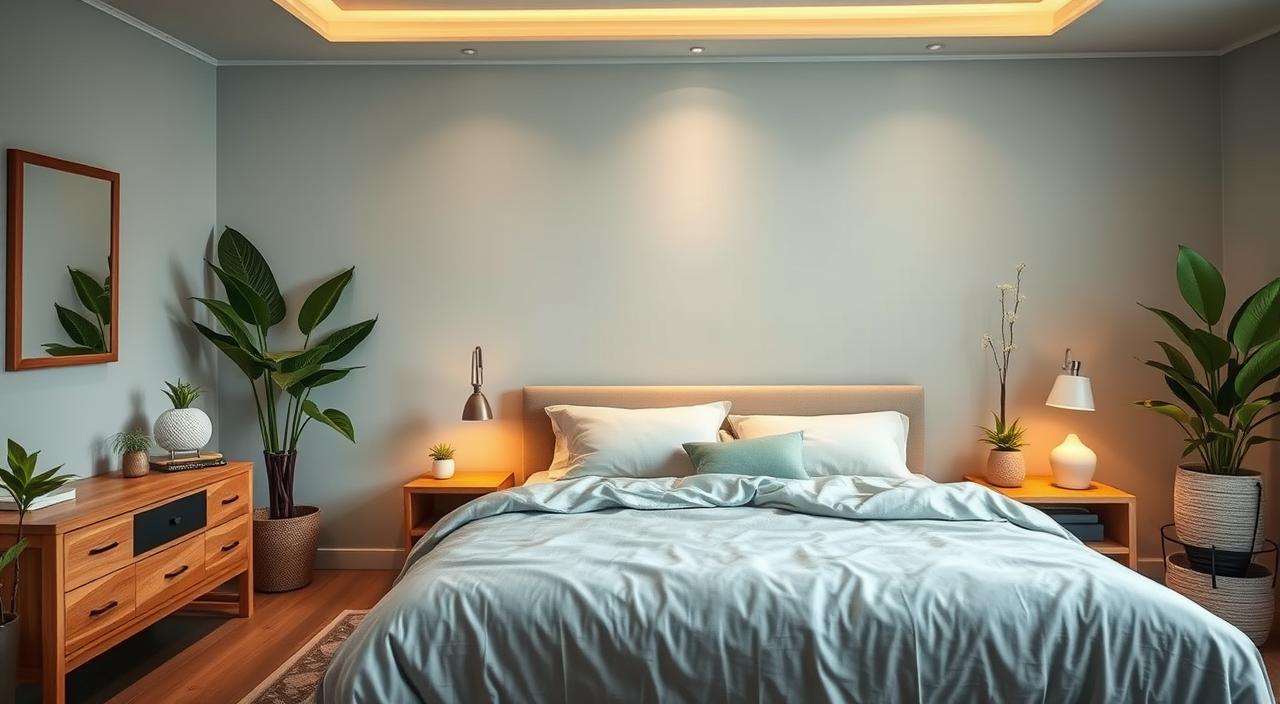
Adding natural things to your bedroom also helps with sleep. Plants, natural light, and organic bedding like cotton connect you to nature. This makes your bedroom calm and refreshing.
“The bedroom is the most crucial space in the home for applying feng shui principles, as individuals spend a significant portion of their time there, especially during sleep.” – Anjie Cho, Feng Shui Expert
Using feng shui in your bedroom can make it a place of peace and rest. It’s about where you put your bed and adding natural elements. These tips can turn your bedroom into a cozy place to relax and sleep well.
Bedroom Decluttering and Organization
Clutter in the bedroom can mess up the energy flow and make you feel stressed. Feng shui, an ancient Chinese art, says a clean and organized bedroom is key for good sleep and well-being.
The bedroom is very important in feng shui, as it affects how well we rest. Getting rid of clutter can greatly improve your sleep. Feng shui also warns against keeping things under the bed, as it can block energy and harm sleep.
To make your bedroom feng shui-friendly, keep it free of extra stuff. This means no clutter under the bed and all drawers and doors shut when not used. A tidy bedroom creates a calm and peaceful space that helps you sleep better.
“Clutter represents stagnant energy that can hinder positive chi flow throughout the home,” explains P.K. Odle, a renowned feng shui expert.
Using feng shui in your bedroom can make it a place for restful sleep. By keeping your space clean and organized, you can make your bedroom a true sanctuary. This brings the benefits of feng shui bedroom decluttering and feng shui bedroom organization into your life.
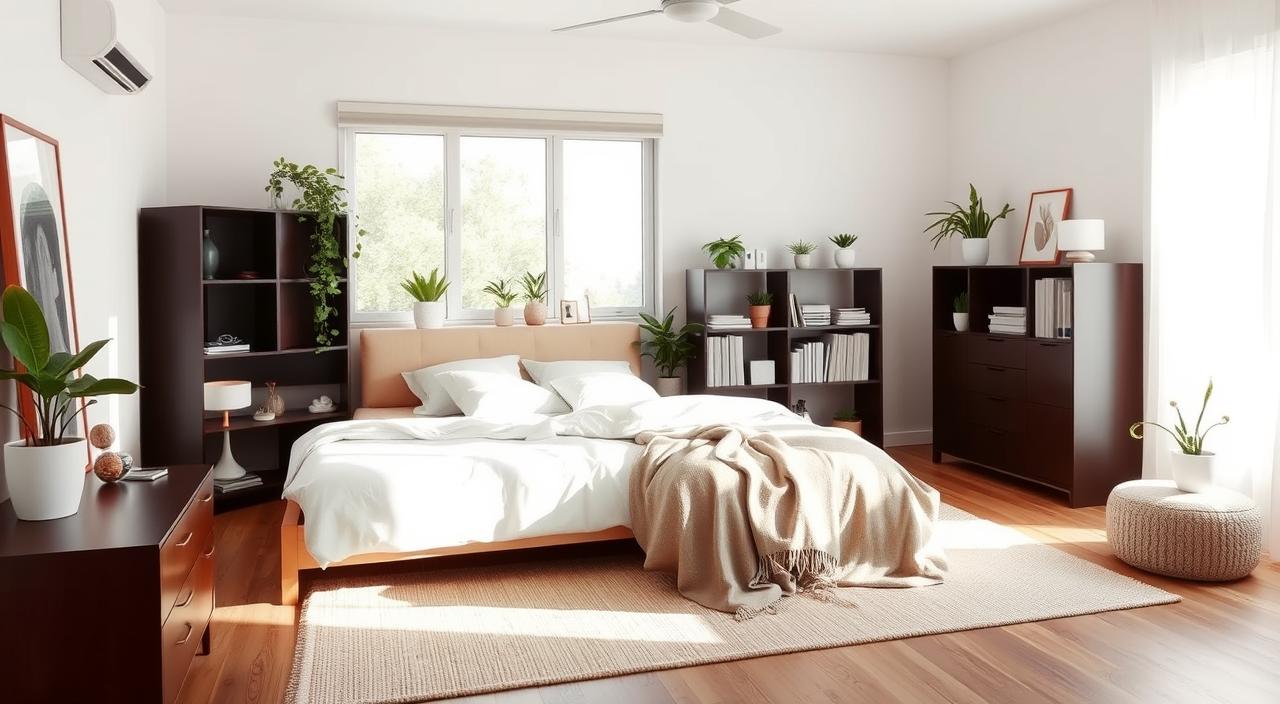
- Clear the space under the bed
- Ensure all drawers and doors are closed when not in use
- Avoid having electronics in the bedroom
- Maintain a clean and organized closet
- Strategically place furniture to promote energy flow
By applying these feng shui tips, you can turn your bedroom into a peaceful place for rest and harmony.
Color Choices for a Serene Bedroom
Choosing the right colors for your bedroom is key to a peaceful sleep space. Feng Shui suggests certain colors can help you relax and sleep better. By using calming colors for sleep, you can make your bedroom a tranquil retreat.
Calming Hues and Their Impact on Sleep Quality
Soft blues, greens, and earth tones are great feng shui bedroom colors. They create a calming atmosphere. These colors help reduce stress and anxiety, making it easier to fall into a deep sleep.
“Blue, green, and teal are recommended Feng Shui bedroom colors for restful sleep, connected to the wood element.”
Pale pastel shades, like soft greens and blues, are especially soothing. They remind us of nature’s calmness. Other colors, like purple, pink, and earthy tones, also bring serenity to your bedroom. Each has its own Feng Shui benefits.
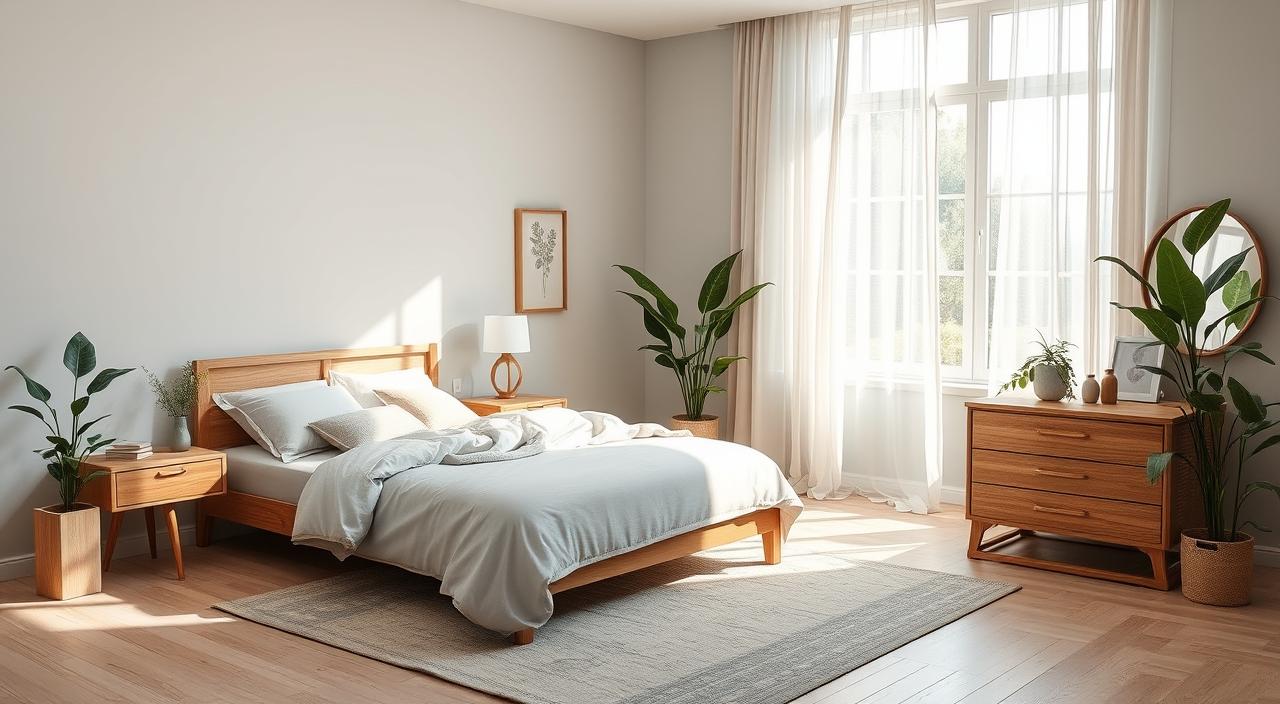
- Blue signifies calm, wisdom, truth, healing, and improved social interactions.
- Green fosters growth, prosperity, balance, and vitality but may be too invigorating for a bedroom in vibrant tones.
- Purple is associated with prosperity, wealth, spirituality, and royalty.
- Pink relates to romantic relationships, femininity, love, and nurturing.
- Earthy tones such as latte, off-white, cocoa, and coral are recommended as base colors for good bedroom Feng Shui.
By choosing feng shui bedroom colors that calm and soothe, you can make a sleep-friendly space. This supports your well-being and helps you wake up feeling refreshed.
Incorporating Nature into the Bedroom
In Feng Shui, adding natural elements to the bedroom is key for a peaceful sleep space. This practice, with over 3,000 years of history, aims to improve well-being and harmony in homes and workplaces.
While Feng Shui isn’t scientifically proven to directly improve health, people say it helps them feel less stressed and more relaxed. One important part is keeping the bedroom tidy to let positive energy flow.
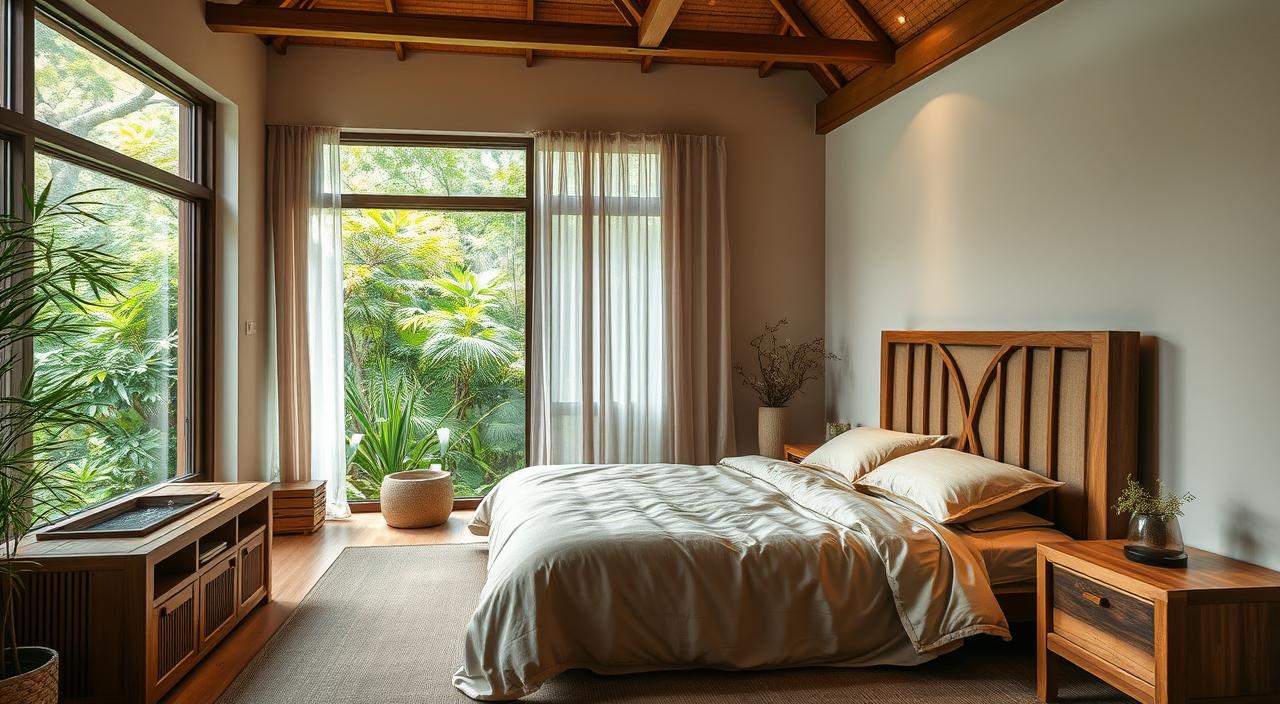
Colors in the bedroom also affect how relaxed we feel. Cool colors like blue, green, and lavender are great for calming down.
Using natural materials like wood, bamboo, and cotton can make the bedroom feel calm and peaceful. Adding plants is also believed to bring life and clean the air, making the bedroom a better place for sleep.
“Bringing nature into the bedroom can have a profound impact on promoting peaceful rest and overall well-being.”
By using Feng Shui and natural elements, we can make our bedroom a place for restful and harmonious sleep. This aligns with the ancient practice’s holistic approach.
Minimizing Electronic Devices
Feng shui teaches that electronic devices like TVs, computers, and phones can mess up the bedroom’s energy. This can hurt your sleep quality. The blue light from these devices can also mess with your body’s natural sleep cycle.
A study found that 91% of people felt less stressed after removing these devices from their bedrooms. This made their sleep space calmer and more peaceful. By cutting down on these devices, you can make your bedroom a better place for sleep.
Feng shui experts say to keep your bedroom free from technology. This means no TVs, laptops, or phones in bed. These feng shui bedroom electronics can block the natural energy flow and make it hard to sleep well.
“By reducing electronics for better sleep, individuals can create a more serene and rejuvenating sleeping environment.”
To improve sleep, try other feng shui tips too. Declutter, use calming colors, and add natural elements. This all-around approach can make your sleep more refreshing and restorative.

Feng Shui Bedroom Accessories
Feng Shui for the bedroom focuses on where you place accessories and decor. This can greatly improve the energy flow and make the room more relaxing. Experts suggest placing mirrors, candles, and other feng shui decor items for bedroom with care. This creates a peaceful and balanced space.
Mirrors should reflect good things, like natural light, not the bed or door. This helps the energy flow well, avoiding any bad effects. Candles and soft lights also add to the calm, helping you relax and sleep better.
Strategically Placed Feng Shui Bedroom Accessories
Feng Shui says the right placement of feng shui bedroom accessories can change the room’s energy and peace. Here are some tips:
- Place mirrors to reflect good things, like light, not the bed or door.
- Use candles and soft lights for a calm feel.
- Put plants or natural things to connect the room with the outdoors.
- Use crystals, chimes, or other Feng Shui decor to improve the space.
By carefully placing these feng shui bedroom accessories, you can make a space that helps you sleep well and feel good.
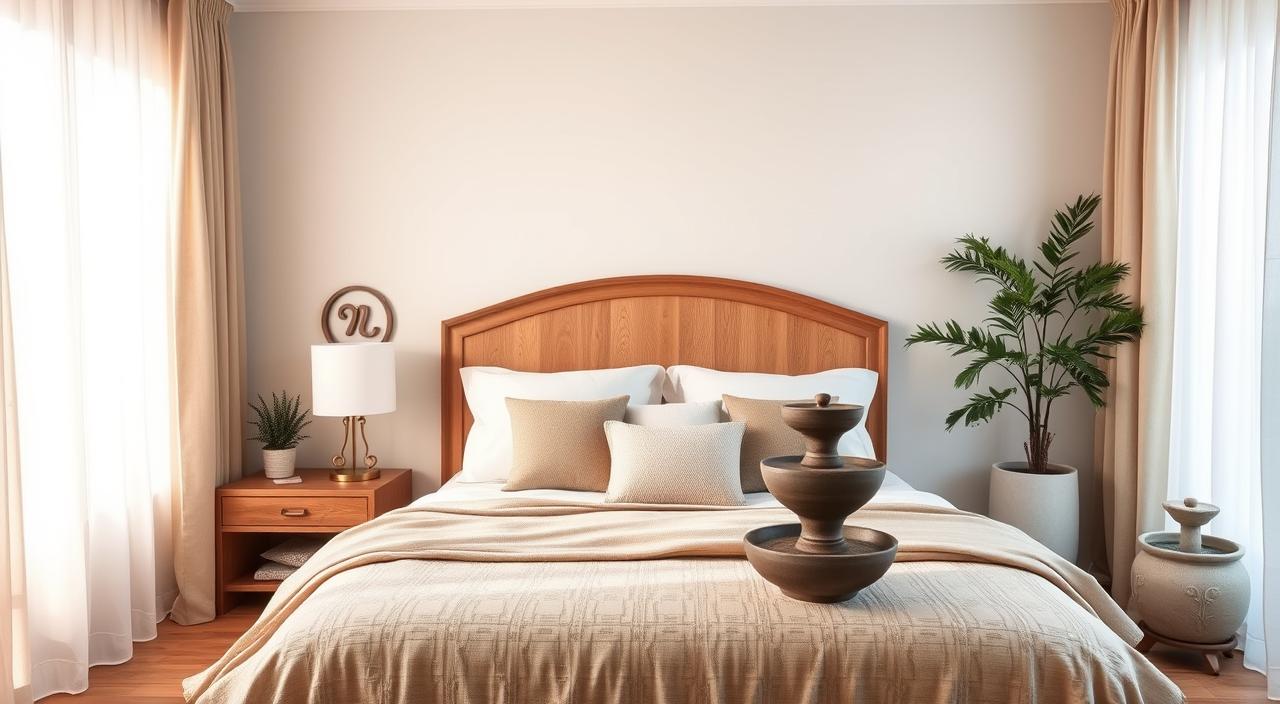
Maintaining Balance and Harmony
Feng shui teaches us to balance yin (passive, feminine) and yang (active, masculine) energies. In the bedroom, this means mixing soft and vibrant elements. Use calming colors and textures with strategic decor items. This balance helps create a peaceful space for better sleep.
Feng Shui experts say 60% of bedroom colors should be soft, like off-white or light brown. These colors help calm and ground us. Amethyst, a favorite Feng Shui crystal, is recommended by 80% of consultants for peaceful sleep.
It’s also important to balance the five elements – earth, fire, water, metal, and air – in the bedroom. Decorating should aim for this balance to harmonize the space and flow of Qi, the life force energy.
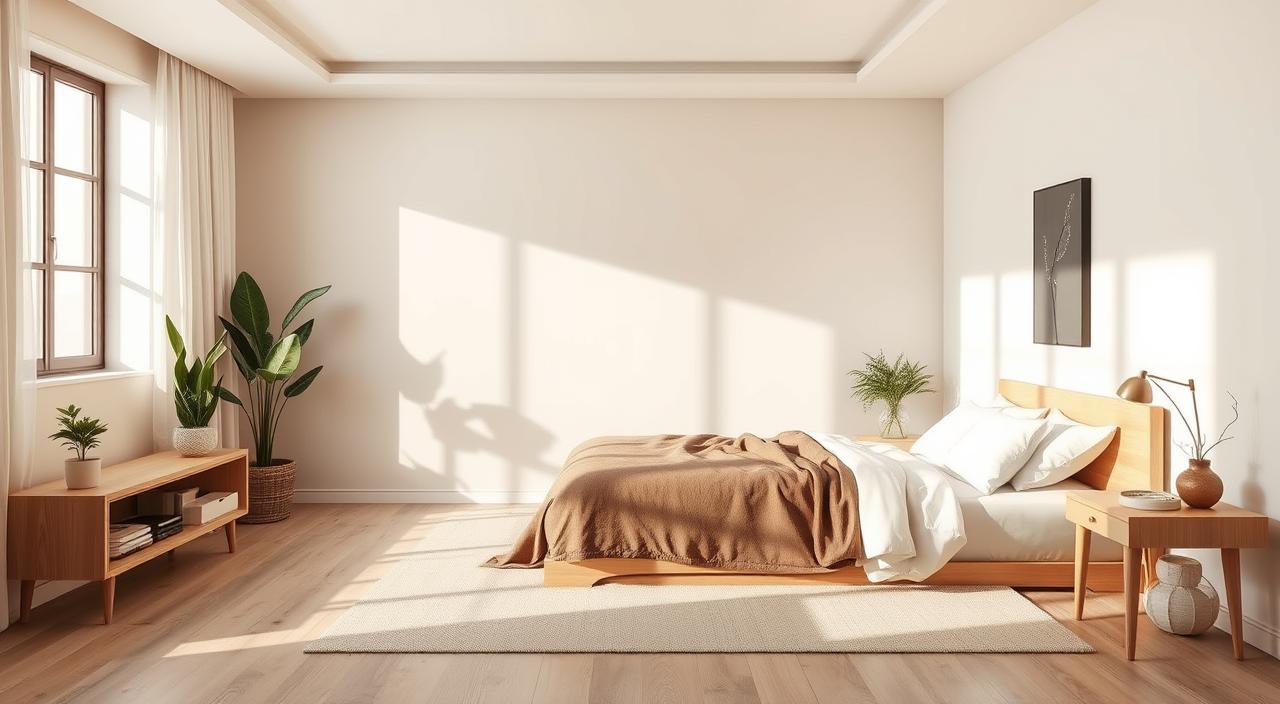
“Feng shui harmonizes the environment to balance the flow of Qi, the life force energy.”
- Use earth tones, neutrals, and whites for simplicity and grounding.
- Place the bed in the “command position” to promote relaxation.
- Add plants with soft leaves to foster compassion and growth.
- Keep books out of the bedroom to avoid brain stimulation at night.
- Don’t block windows with the bed to avoid the fight or flight response.
By keeping the bedroom balanced and harmonious, we can make it a peaceful retreat. This supports better sleep and overall well-being.
Conclusion
Using feng shui bedroom tips can change how we sleep and feel. It’s about placing the bed right, adding natural elements, and cutting down on tech. This makes a space that helps us sleep better and feel good.
By following feng shui, we can turn our bedrooms into peaceful places. These places help us find balance and harmony. This balance can make our daily lives better.
A bedroom can become a place for deep sleep with feng shui. It aligns with universal forces to improve energy flow. This makes a space for relaxation and wellness.
This approach to bedroom design can really help. It can make our sleep better, our mood brighter, and our minds clearer.
Whether you want to attract love or just relax, applying feng shui for better sleep is powerful. It lets us create a bedroom that supports our wellbeing. This helps us do well in all parts of our lives.
Enhance Your Life with Feng Shui Jewelry
Bring balance and positive energy into your life with Feng Shui Jewelry. Our carefully crafted pieces are designed to enhance your well-being and attract harmony. Want to experience the benefits for yourself? Click here to explore our collection and find your perfect piece.
FAQ
What is the importance of Feng Shui in the bedroom?
Feng Shui is an ancient Chinese philosophy. It focuses on arranging objects and space to improve energy flow. The bedroom is key for Feng Shui, as it’s where we spend a lot of time sleeping.
By applying Feng Shui to the bedroom, we can make it a peaceful place. This supports better sleep and overall well-being.
How does bed positioning impact Feng Shui in the bedroom?
The bed’s position is vital in Feng Shui. It should be placed diagonally from the door. This allows you to see the door but not be directly in line with it.
This position is thought to make you feel safe and in control. It helps you sleep better.
What other Feng Shui strategies can be implemented in the bedroom for restful sleep?
Feng Shui experts suggest several strategies for a restful bedroom. Avoid placing the bed in line with the door, as it’s seen as the “coffin position.” It can disrupt energy flow.
Also, adding plants and natural light is important. It connects the bedroom to nature and makes it calmer.
How does clutter and disorganization impact the Feng Shui of the bedroom?
Clutter and disorganization can harm the bedroom’s energy flow. They can make you feel stressed and restless. Feng Shui advises keeping the bedroom tidy and organized.
This means clearing the space under the bed and keeping drawers and doors closed. A clean bedroom is calming and supports better sleep.
What role do colors play in the Feng Shui of the bedroom?
Colors in the bedroom greatly affect its energy and atmosphere. Feng Shui suggests using soft colors like blues, greens, and earth tones. These colors help you relax and sleep better.
They create a calm environment, reducing anxiety and improving sleep quality.
How can incorporating natural elements into the bedroom enhance Feng Shui?
Feng Shui values natural elements in the bedroom. They connect the space to nature and promote balance. Using wood, stone, and plants is recommended.
These elements improve energy flow and make the bedroom more serene for sleep.
What is the impact of electronic devices on the Feng Shui of the bedroom?
Feng Shui warns against electronic devices in the bedroom. They can disrupt energy flow and harm sleep. Devices like TVs and phones emit blue light that affects sleep.
Reducing electronic devices in the bedroom helps create a better sleep environment.
How can Feng Shui bedroom accessories and decor contribute to a restful sleeping environment?
Feng Shui suggests strategic placement of accessories and decor. Mirrors should reflect natural light, not the bed or door. Candles and mood lighting also help create a calming atmosphere.
These elements support relaxation and better sleep.
What is the importance of maintaining balance and harmony in the Feng Shui of the bedroom?
Feng Shui emphasizes balance between yin and yang energies in the bedroom. This means using both soft and vibrant elements. Soft colors and textures should be balanced with accents and decor.
This balance creates a harmonious environment that promotes relaxation and better sleep.









